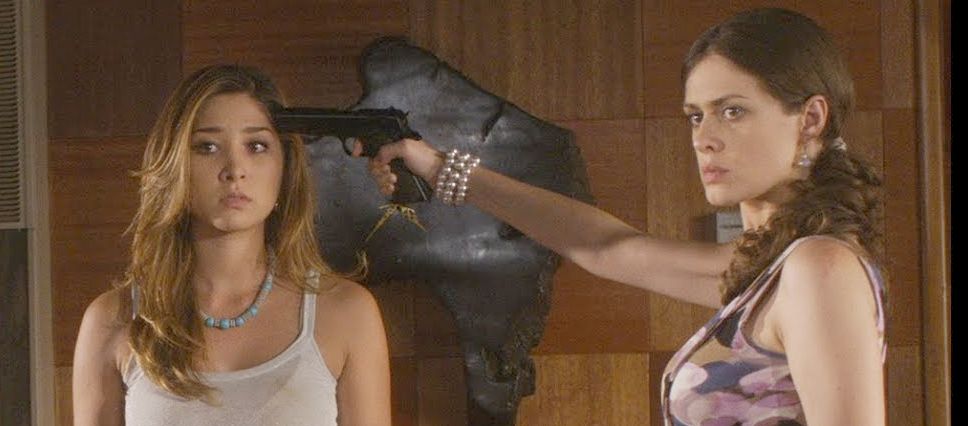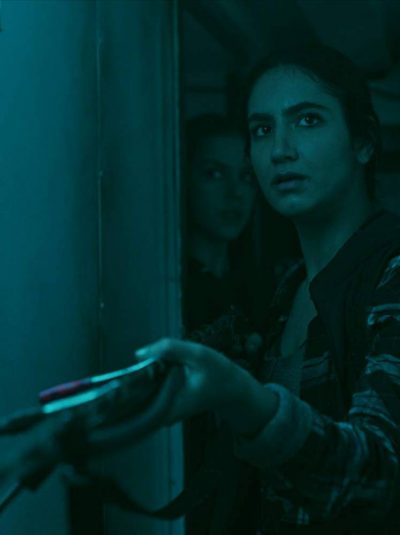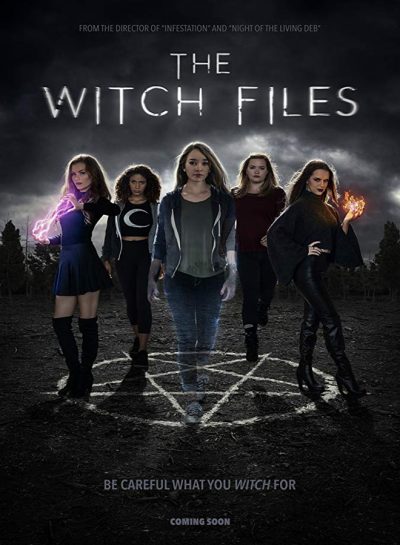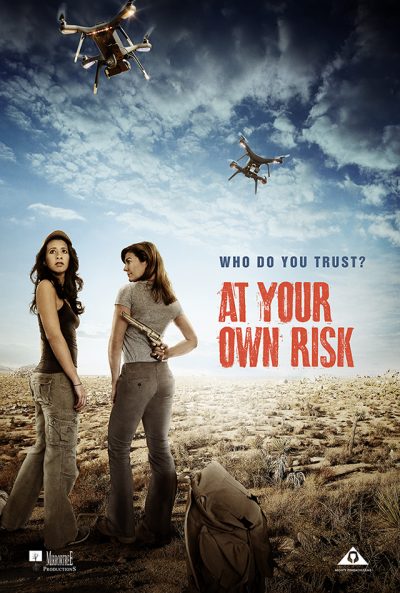★★★½
“The real female Ghostbusters…”
 I’ll confess, the headline above is a bit click-baity. This is perhaps closer to a female version of The Frighteners, the early Peter Jackson film in which Michael J. Fox could see dead people, and had to learn to work with them. The conduit in this case is Rika (Yanagi), a young woman who has been able to see ghosts since a young age. But an encounter with a trio of ghosts, all murder victims who are seeking revenge on their killers, opens a whole new realm. For, it turns out, whenever Rika is in a life-threatening situation, the spirits can take physical form. They can also draw energy from her, which can be used to create weapons, which range from the merely strange (the “meat hammer”) to the bat-shit insane. None more so there, than that of Akari (Mikado). She has a tendency to go into puppy mode when stressed, which involves her becoming… a bit licky. So inevitably her weapon transforms Akari’s hand into Grudge Dog, capable of ripping the face off her opponent.
I’ll confess, the headline above is a bit click-baity. This is perhaps closer to a female version of The Frighteners, the early Peter Jackson film in which Michael J. Fox could see dead people, and had to learn to work with them. The conduit in this case is Rika (Yanagi), a young woman who has been able to see ghosts since a young age. But an encounter with a trio of ghosts, all murder victims who are seeking revenge on their killers, opens a whole new realm. For, it turns out, whenever Rika is in a life-threatening situation, the spirits can take physical form. They can also draw energy from her, which can be used to create weapons, which range from the merely strange (the “meat hammer”) to the bat-shit insane. None more so there, than that of Akari (Mikado). She has a tendency to go into puppy mode when stressed, which involves her becoming… a bit licky. So inevitably her weapon transforms Akari’s hand into Grudge Dog, capable of ripping the face off her opponent.
For I didn’t yet mention, the director is also responsible for some of the finest examples in Japanese splatter, perhaps peaking with The Machine Girl (which may well have informed one of the weapons here, as shown in the trailer). But also including a hand in Mutant Girl Squad and Robogeisha. This is relatively restrained, though the key-word there is “relatively.” There’s certainly the same degree of lunatic inventiveness at work, although the arterial spurting is considerably lower pressure than you’d expect: the comparison above to early Peter Jackson is entirely deliberate. For the most part it’s goofily endearing rather than outrageously offensive, and quite well thought out. Even if Rika is more a pipeline for vengeance, she tries to act as the group’s moral compass, for example refusing to let the ghosts take vengeance on the daughter of one culprit.
There are still a few scenes which seem a bit sleazy. Not least, that the energy transfer mentioned above is lip-to-lip. Basically, it’s a shallow excuse for some lesbo makeout sessions, which feels at odds with an approach which sometimes seems closer to Disney than extreme gore. And there’s some dancing in underwear which made me feel mildly uncomfortable; it seemed gratuitous, even by Iguchi’s standads. I was also surprised by the way the vengeance largely ended up compacted into a single battle; if this had been paced throughout the film (like Kill Bill), it might have been more effective and enjoyable. However, I still watched the vast bulk of this with a grin on my face, and laughed out loud more than once. It perhaps helped that, going in, I didn’t know who the director was; indeed, the poster above was about all I had to go on. My expectations were closer to a light comedy with action elements, and the imagination here definitely came as a pleasant surprise.
Dir: Noboru Iguchi
Star: Anna Yanagi, Sumire Ueno, Minori Mikado, Yuni Hong





 ★★★
★★★ Coming in on a wave of hype, e.g. “The Best Indie Science Fiction Movie Since Moon“, I guess I should have listened – because I didn’t think Moon was
Coming in on a wave of hype, e.g. “The Best Indie Science Fiction Movie Since Moon“, I guess I should have listened – because I didn’t think Moon was  It’s one of those weird coincidences. I watched two action heroine flicks last weekend and both, while American, starred actresses who were born in Greece. Really, what are the odds?
It’s one of those weird coincidences. I watched two action heroine flicks last weekend and both, while American, starred actresses who were born in Greece. Really, what are the odds? 
 My heart sank in the first few seconds, when I discovered that this was a SyFy Original Movie. The really poor CGI, of a ship sailing on the ocean, seemed to confirm that I was in for one of their bottom of the barrel productions. In the end, however, this was… just about okay. Incredibly derivative, to be sure, and that’s not its only problem. Yet it still just about sustained my interest. That’s certainly not always the case for SyFy Original Movies, to put it mildly.
My heart sank in the first few seconds, when I discovered that this was a SyFy Original Movie. The really poor CGI, of a ship sailing on the ocean, seemed to confirm that I was in for one of their bottom of the barrel productions. In the end, however, this was… just about okay. Incredibly derivative, to be sure, and that’s not its only problem. Yet it still just about sustained my interest. That’s certainly not always the case for SyFy Original Movies, to put it mildly. If John Hughes directed a film about witchcraft, it’d probably end up like this. For you have five stereotypical high-school girls in detention: Brooke the rich bitch (Ziolkoski); Greta the jock (Adrienne Rose-White); M.J. the timid mouse (Robinson); Jules the goth (Flatmo); and Claire the nerd (Taylor), who isn’t actually
If John Hughes directed a film about witchcraft, it’d probably end up like this. For you have five stereotypical high-school girls in detention: Brooke the rich bitch (Ziolkoski); Greta the jock (Adrienne Rose-White); M.J. the timid mouse (Robinson); Jules the goth (Flatmo); and Claire the nerd (Taylor), who isn’t actually  The first in an intended trilogy, this stands on its own reasonably well, balancing between tying up the loose ends and leaving the future uncertain. The heroine is Ja-Yoon (Kim), who begins by escaping from a shadowy, quasi-governmental facility as a raw eight-year-old, despite being hunted by the woman in charge, Dr. Baek (Jo) and her minions. She is found by husband and wife farmers, and they adopt Ja-Yoon, who has no apparent memory of her early life as their own. Ten years later, with Mom suffering from Alzheimer’s, and the farm struggling financially, Ja-Yoon enters a nationwide singing contest. However, the resulting attention brings her firmly back on the radar of Dr. Baek and Nobleman (Choi), the other survivor from that night a decade ago. The not-so-good doctor won’t let Ja-Yoon escape this time.
The first in an intended trilogy, this stands on its own reasonably well, balancing between tying up the loose ends and leaving the future uncertain. The heroine is Ja-Yoon (Kim), who begins by escaping from a shadowy, quasi-governmental facility as a raw eight-year-old, despite being hunted by the woman in charge, Dr. Baek (Jo) and her minions. She is found by husband and wife farmers, and they adopt Ja-Yoon, who has no apparent memory of her early life as their own. Ten years later, with Mom suffering from Alzheimer’s, and the farm struggling financially, Ja-Yoon enters a nationwide singing contest. However, the resulting attention brings her firmly back on the radar of Dr. Baek and Nobleman (Choi), the other survivor from that night a decade ago. The not-so-good doctor won’t let Ja-Yoon escape this time. This is one of those films where
This is one of those films where  High-schoolers Reilly (Albuquerque) and Erica (Wallace) have discovered a way to literally print money, forging hundred-dollar bills. They then use these to buy high-end fashion, and sell these ill-gotten gains on to their schoolmates for genuine cash. The more cautious Reilly wants to stop, but realizes she can do good by helping Karen (Butler), her aunt and guardian, who is in financial trouble. So when Erica is insistent they expand, Reilly goes along with it, and they use the school’s art-class resources to up their game, laundering the fake money through foreign exchange stores. However, this criminal empire comes under threat, after art teacher Tim Sylvester (MacCaull) discovers what they’re up to. Because by chance, he owes a large sum of money to some nasty people, and starts a relationship with Erica, to make sure she’ll keep working for his benefit. Worse still, the Secret Service have been alerted to the flood of funny money, so are also investigating.
High-schoolers Reilly (Albuquerque) and Erica (Wallace) have discovered a way to literally print money, forging hundred-dollar bills. They then use these to buy high-end fashion, and sell these ill-gotten gains on to their schoolmates for genuine cash. The more cautious Reilly wants to stop, but realizes she can do good by helping Karen (Butler), her aunt and guardian, who is in financial trouble. So when Erica is insistent they expand, Reilly goes along with it, and they use the school’s art-class resources to up their game, laundering the fake money through foreign exchange stores. However, this criminal empire comes under threat, after art teacher Tim Sylvester (MacCaull) discovers what they’re up to. Because by chance, he owes a large sum of money to some nasty people, and starts a relationship with Erica, to make sure she’ll keep working for his benefit. Worse still, the Secret Service have been alerted to the flood of funny money, so are also investigating.